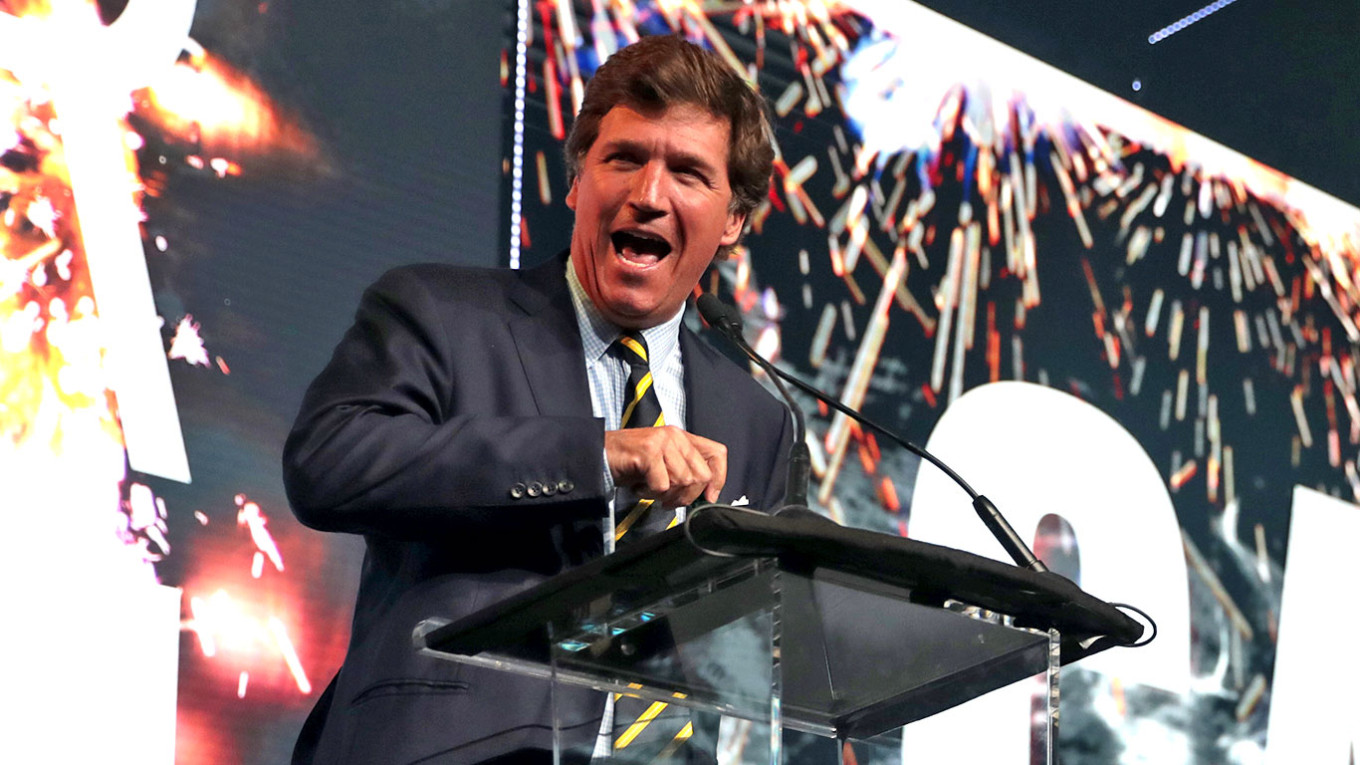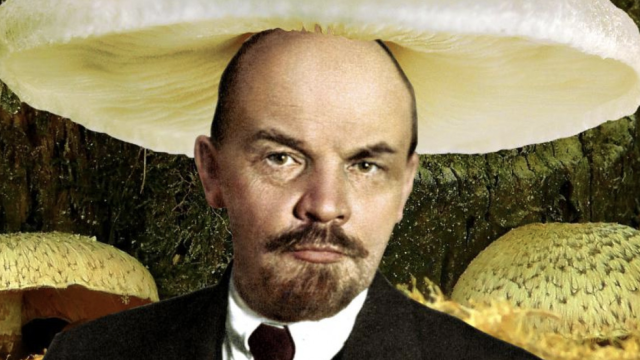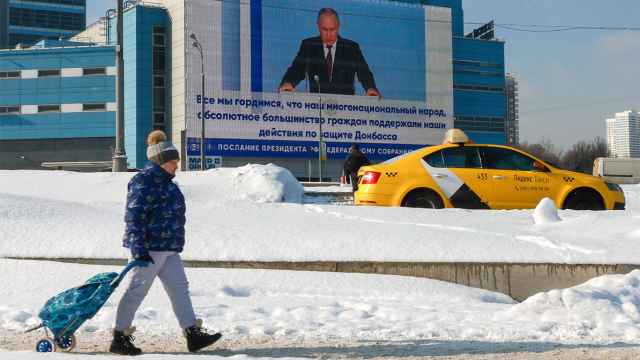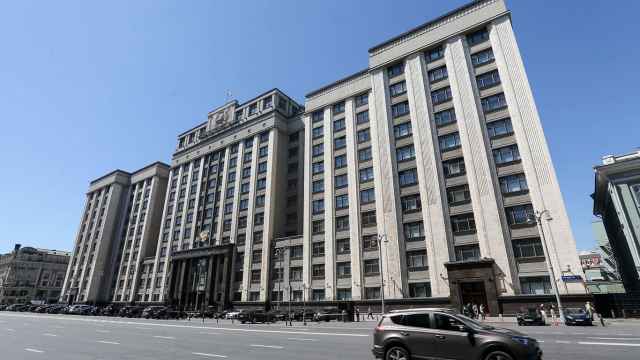When Russian state media scrambled to build a narrative to justify Moscow’s unprovoked invasion of Ukraine, they received what must have felt like a gift. Tucker Carlson, one of the most high-profile television personalities in the United States and beyond, used a March 2022 episode of his primetime show to give oxygen to a bizarre conspiracy theory about the supposed development of U.S. bioweapons in Ukraine.
The bioweapons conspiracy theory had been simmering in fringe online communities for several weeks, after a follower of QAnon stumbled across a decades-old Russian disinformation campaign, smushed it together with conspiracy theories about the origins of the Covid-19 pandemic, and then tacked it on to the events in Ukraine.
Carlson’s intervention shot this conspiracy theory into the stratosphere. He took this piece of regurgitated Russian disinformation and blasted it into the living rooms and minds of middle America. By April 2022, a YouGov poll found that an astounding 28% of American respondents said that it was “definitely” or “probably true” that the U.S. had been developing “bioweapons” in laboratories across Ukraine. A further 30% said they were unsure.
It is astonishing that more than a quarter of Americans had been convinced of a baseless conspiracy that frames Ukraine and Washington as the aggressors and Russia’s invasion as an act of self-defense.
Likewise, it is unclear what role, if any, Russian state actors played in boosting this narrative to the point where it caught Carlson’s attention. But they could not have asked for a better outcome and almost certainly could not have achieved it without him.
The bioweapons narrative was neither the first nor the last time that Carlson’s work has been of extraordinary value to Russian state media, but also to Moscow’s propaganda strategy more broadly. Carlson has emerged as one of the loudest voices opposing Western support for Ukraine, while continuing to speak positively of Russia and even Putin himself.
Leaked memos from the Kremlin to Russian state media in the week following the full-scale invasion contained instructions stating that it was “essential to use as much as possible fragments of broadcasts of the popular Fox News host Tucker Carlson.” His assertions that NATO and the West provoked the violence in Ukraine has clearly won him fans in Moscow.
Before the invasion, Carlson was occasionally mentioned on Russian state television and online media. He has since become a regular topic of discussion, with his ousting from Fox News widely covered in Russia. Ironically, though Carlson may no longer be on American television, he still is in Russia, where Rossiya 24 has taken to airing dubbed clips of his new webseries as a television show.
To be clear, there is no indication or suggestion that Carlson is intentionally collaborating with Russian state actors. When asked about Rossiya 24 rebroadcasting his content, Carlson said he did not know anything about it and had not approved it. Nor has he publicly responded to overtures by Russian talking heads and state media offering him jobs after his departure from Fox.
Carlson is valuable to the Kremlin’s mouthpieces not because they control him, but because they are fundamentally selling the same product. Their vision of the U.S. is one of a decrepit, decaying empire, bloated by liberal decadence and falling apart under the weight of its own hypocrisies.
But here’s the thing: Carlson is better at it.
Whatever else might be said about him, Carlson is an undeniably talented media operator whose finger is on the pulse of the American zeitgeist. Moreover, unlike Russian state media hosts, Carlson’s doom-laden portrayals of American carnage are delivered with a recognizably American voice, giving his words a ring of authenticity that Vladimir Solovyov or Olga Skabayeva could never achieve.
His firing from Fox News fed into this apparent credibility, allowing Russian state media to portray him as a kind of American Cassandra, who was unfairly cast out from Fox News and banished to roam the badlands of the platform formerly known as Twitter for his fearless commitment to speaking the truth.
This is, of course, almost exactly the opposite of what happened. In reality, Carlson was taken off air in what he alleges was part of the settlement with Dominion Voting Systems in its successful defamation case against Fox News. The network was accused of promoting conspiracy theories about the 2020 presidential election having been rigged (Fox News has denied that Carlson’s removal was linked to the Dominion case).
Carlson is also useful as a weathervane for Russian state media as they seek new ideas to fill the news cycle with anti-U.S., anti-Ukraine and anti-NATO content. He understands where the deepest and most salient fractures in American society lie far better than Russian state media. He knows how the political and media ecosystems work, and which buttons to press to get the biggest reaction.
This benefits Russian propagandists because it allows them to piggyback off Carlson’s knack for polarization. Russian news hosts take clips of Carlson’s shows and build their own segments around them, following his lead on topics and expanding on his narratives. In some ways perhaps it’s only the logical conclusion that one of them would eventually just cut out the middleman and make an entire show based around Carlson’s clips.
My colleagues and I at the Institute for Strategic Dialogue have spent years studying both overt and covert Russian influence campaigns. Their tactics may change, but their strategy remains broadly the same: stoking existing divisions and turning up the dial on polarization, rather than seeking to invent new issues with no basis in reality.
Most recently, I looked into a small covert influence operation linked to Russia Today that is run largely on Telegram. It targeted audiences in the U.S. and Europe. Guess what RT was doing with it? Mostly just sharing clips of U.S. cable news shows.
Russian state media understands full well that the U.S.’s own outrage industrial complex is far more effective at stoking division in the U.S. than they will ever be. When it comes to Carlson specifically, they seem to recognize that their main role is to help spread his message to as large an audience as they can and leave the rest up to him.
Because he will do it much better than they can.
A Message from The Moscow Times:
Dear readers,
We are facing unprecedented challenges. Russia's Prosecutor General's Office has designated The Moscow Times as an "undesirable" organization, criminalizing our work and putting our staff at risk of prosecution. This follows our earlier unjust labeling as a "foreign agent."
These actions are direct attempts to silence independent journalism in Russia. The authorities claim our work "discredits the decisions of the Russian leadership." We see things differently: we strive to provide accurate, unbiased reporting on Russia.
We, the journalists of The Moscow Times, refuse to be silenced. But to continue our work, we need your help.
Your support, no matter how small, makes a world of difference. If you can, please support us monthly starting from just $2. It's quick to set up, and every contribution makes a significant impact.
By supporting The Moscow Times, you're defending open, independent journalism in the face of repression. Thank you for standing with us.
Remind me later.








